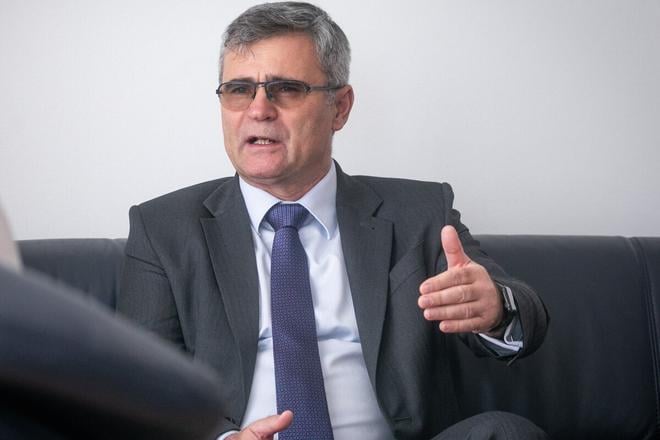If the forces that want to direct Slovak foreign policy away from its euro-atlantic direction come to power, they could succeed in doing so, says Peter Mišík, an experienced diplomat and deputy foreign minister.
Slovakia would benefit from Ukraine's accession to the EU, but enlargement must happen simultaneously with the reform of the Union and must be prepared on both sides so that it turns out to be a success story as opposed to a disappointment. The situation around Ukrainian grain also shows that our market is not yet ready to accept products from Ukraine, and we should learn from this, Mišík points out in an interview with The Slovak Spectator.
Read this interview to find out:
why the EC President mentioned Ukraine only in passing,
what Ukraine's accession to the EU will mean for Slovakia,
whether the State Secretary shares the concerns about Slovak foreign policy after the elections,
whether the EU really needs to be completed,
why the Secretary of State would not interfere with the veto in decision-making in Brussels.
In her recent State of the Union address, European Commission President Ursula von der Leyen did not mention Ukraine as much as last year. How is the Slovak audience supposed to understand this? Has the EU cooled towards Ukraine?
Not at all. The EU has taken a specific step by giving Ukraine candidate status in 2022, and Slovakia has also strongly supported this. If you had asked about this before 2022, everyone would have shaken their heads in disbelief and say that Ukraine would never become a member. Now the accession process is under way and there is no need to talk about whether Ukraine will be or is part of this project. We know it is.
What will the EU accession of Ukraine and the Western Balkans mean for Slovakia?
When Slovakia joined in 2004, there was also a big discussion about what enlargement would mean. And the countries that benefit the most from it today, like Germany and Austria, were the most vocal at the time in their concerns about what it would bring them. They were worried that cheap labour would come in, that investment would go out. It turned out to be just the opposite. Further enlargement is a great opportunity for Slovakia as well. The accession of Ukraine means huge opportunities for eastern Slovakia, just as our accession was for the east of Austria. I remember what it looked like at the end of the 1990s and everyone can see what it looks like today. Of course, there is a price. The enlargement will bring more competition for our companies, but competition is not a bad thing. It forces us to innovate, to look for ways to increase our efficiency, to be better. So, on the whole, it can drag us down, but it has to be well prepared. Today, for example, we see that our market is not ready to receive agricultural products from Ukraine. This is a warning to both sides to prepare well for this.
Charles Michel mentioned Ukraine could join the EU in 2030. Is that a realistic, optimistic or pessimistic scenario?
There is no clear answer to that. Because when you say that something will happen at a definite moment, you raise expectations that may not be entirely realistic. The second thing is that you are depriving the candidate countries a little bit of the motivation to make an effort. In the EU, on the other hand, things will only move when we set deadline. I think the exact date is important, but even more important is that the accession is a success. That is why we must be responsible and only promise what we can deliver.
The head of the European Commission also mentioned Georgia, saying that the European perspective is also important for its people.
Georgia has a different status from Ukraine because it is not a candidate state. But it has a guarantee that its potential candidacy status will be considered. If the Georgian government sees a future in Europe, Europe will be open. We are keeping our fingers crossed for them to choose a future in the EU, but it's their decision.
We in Slovakia had the 1990s, where it was decided whether this country would go one way or the other. That was an absolutely crucial moment in terms of Slovakia's development, although people take it for granted now. Georgia may be experiencing something similar today.
Some commentators say that Slovakia is experiencing something similar today, too. Colleagues from abroad tell us that even abroad they are looking at Saturday's elections with concern as to whether the direction of Slovakia will change. Do you share these concerns?



 Peter Mišík (source: Courtesy of the Ministry of Foreign and European Affairs)
Peter Mišík (source: Courtesy of the Ministry of Foreign and European Affairs)